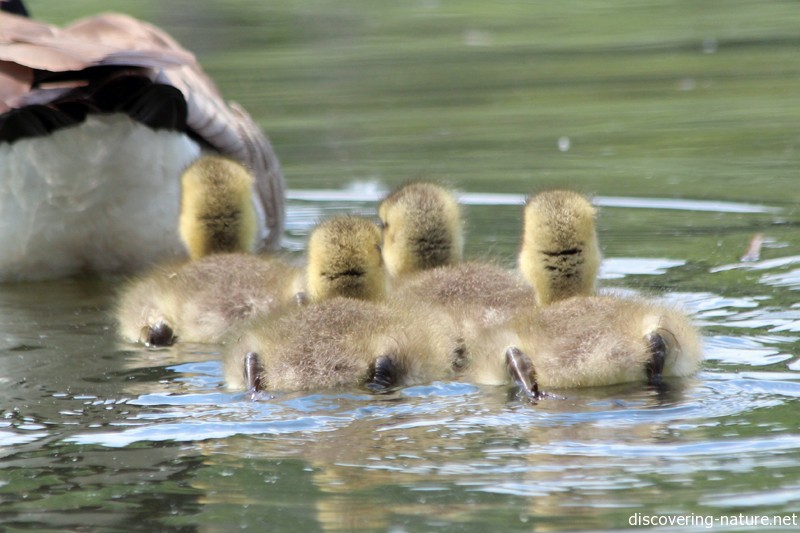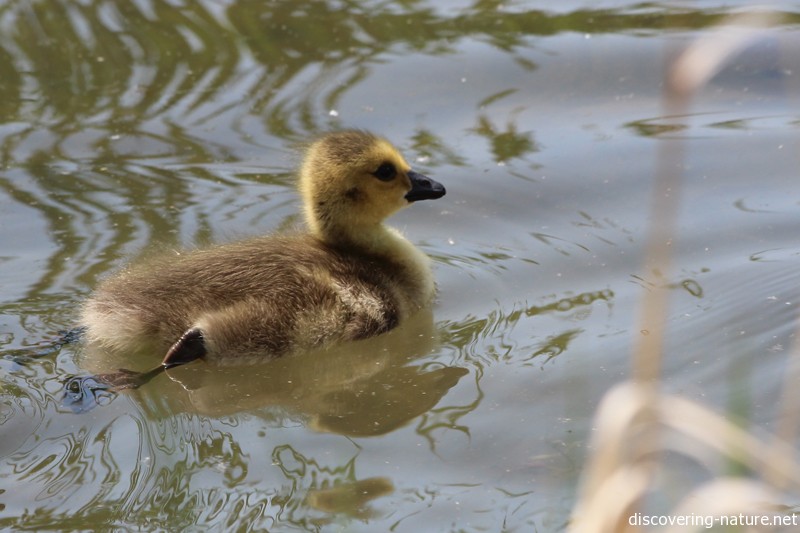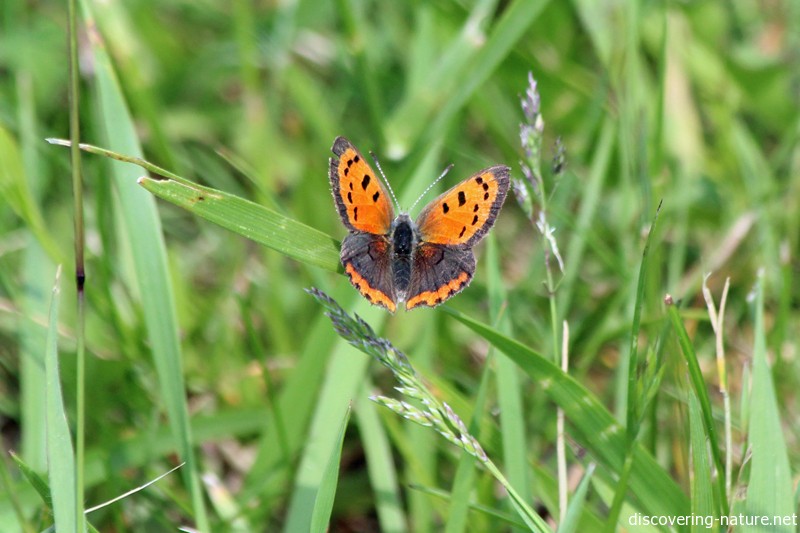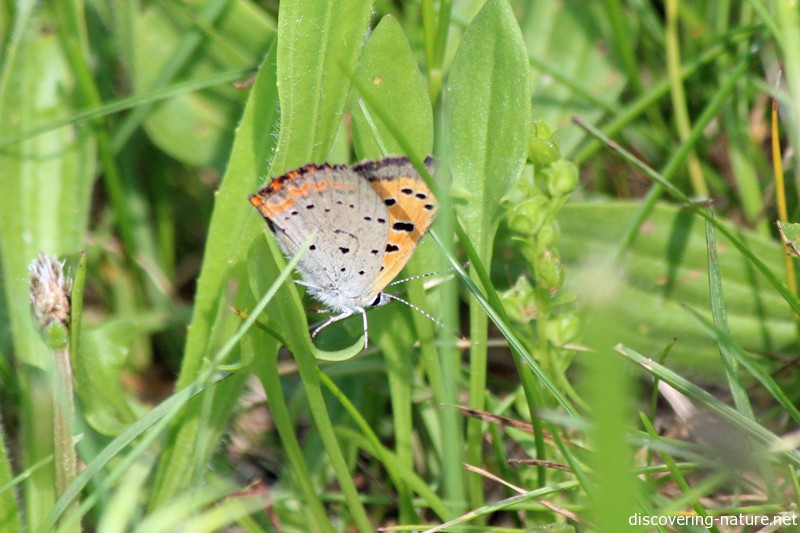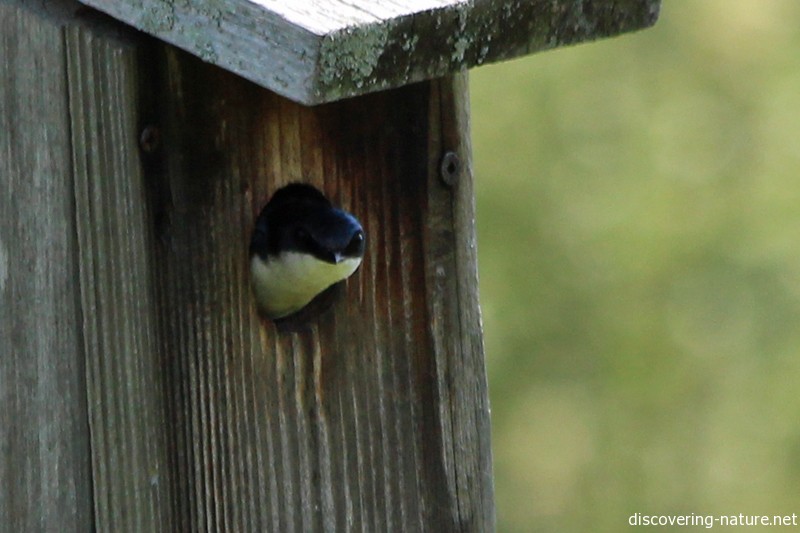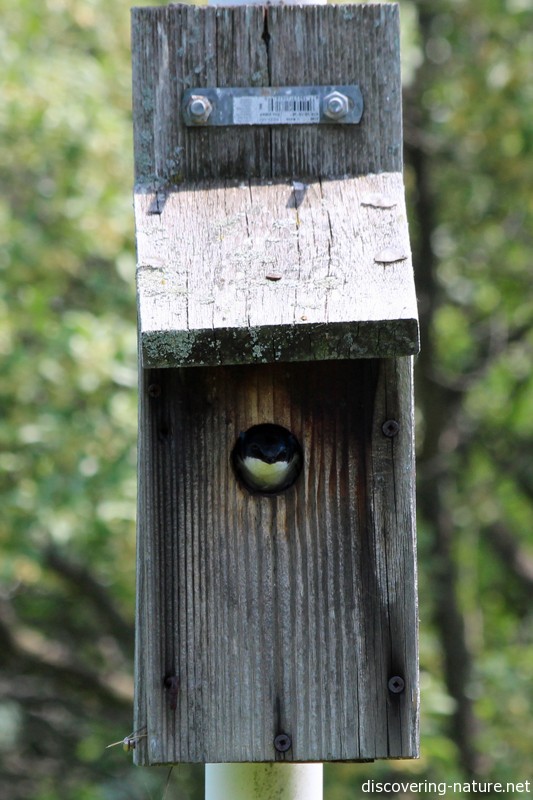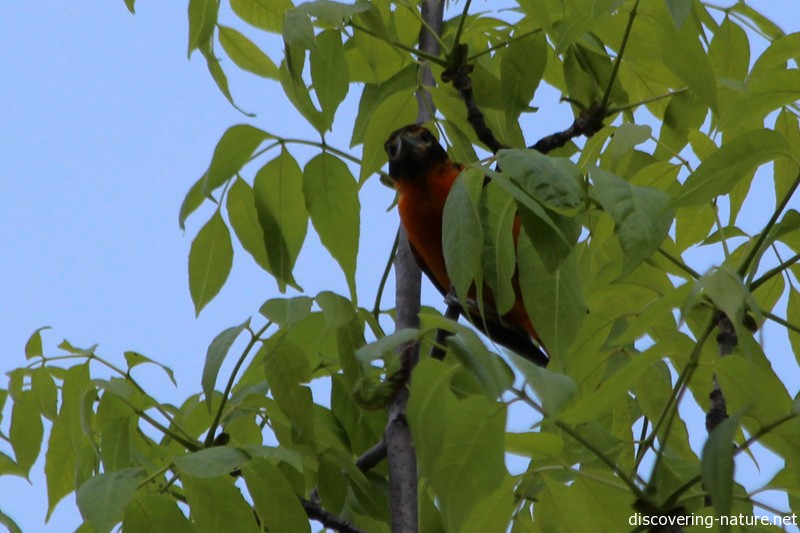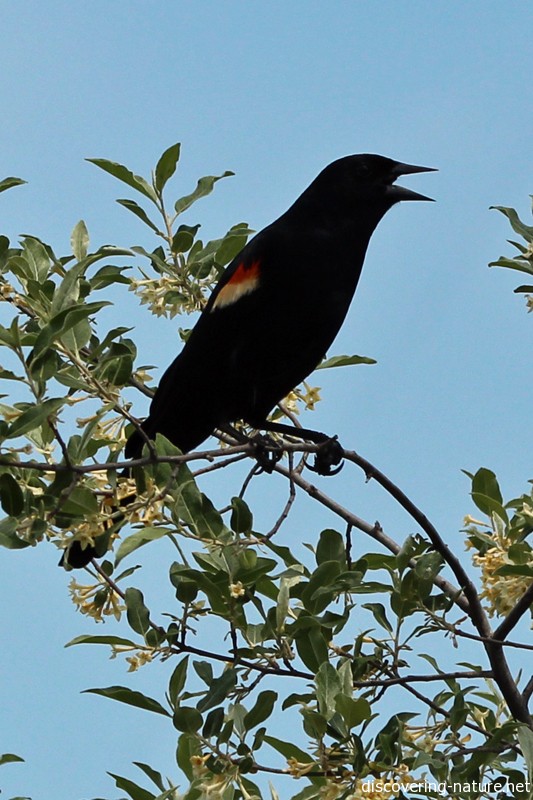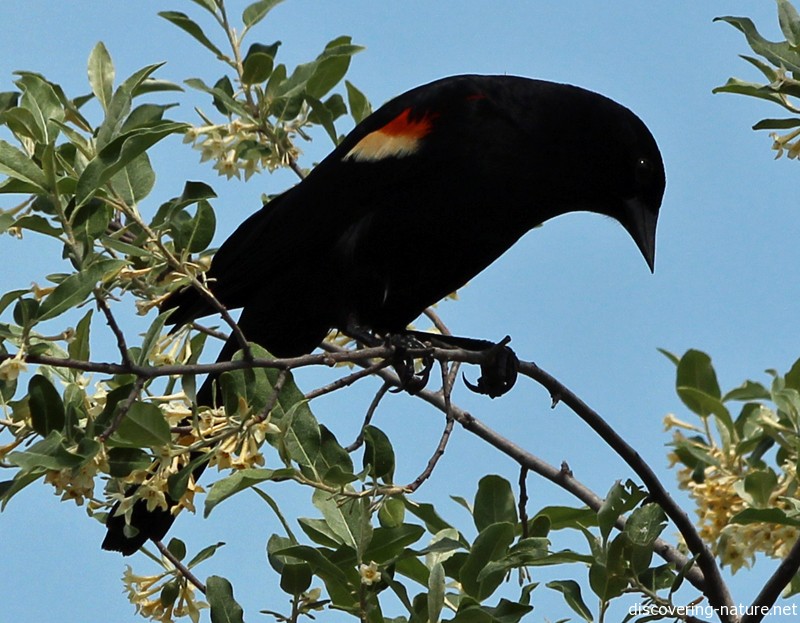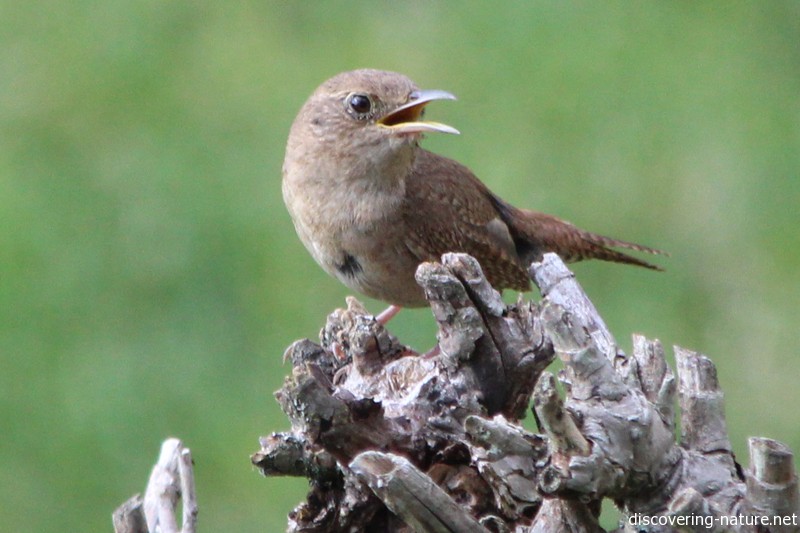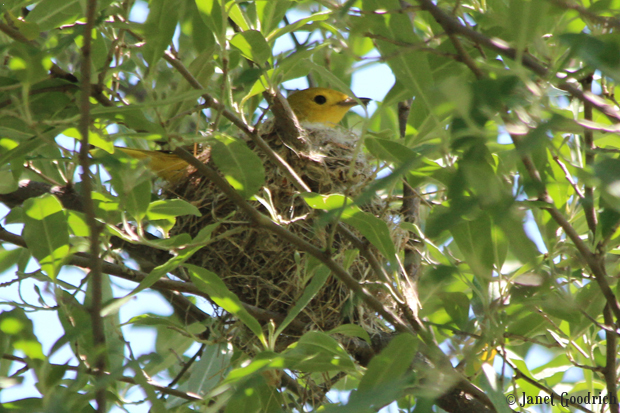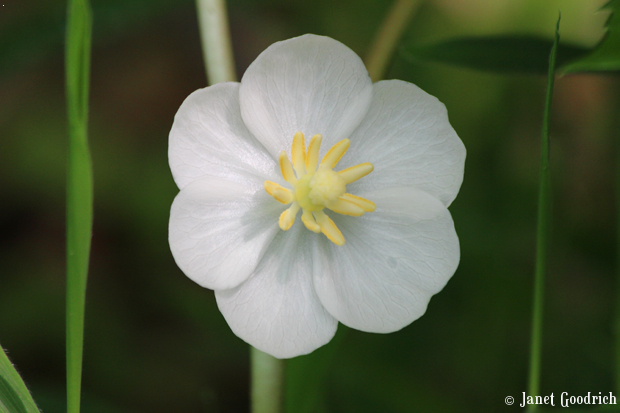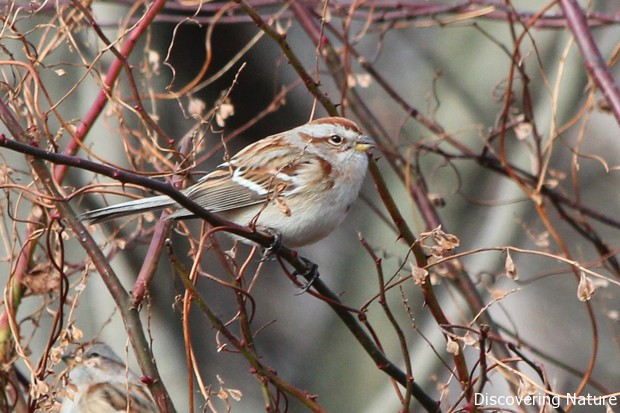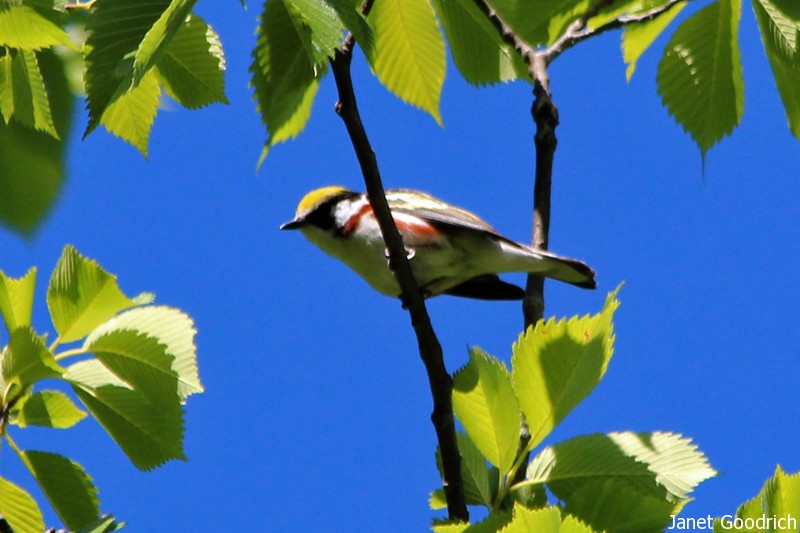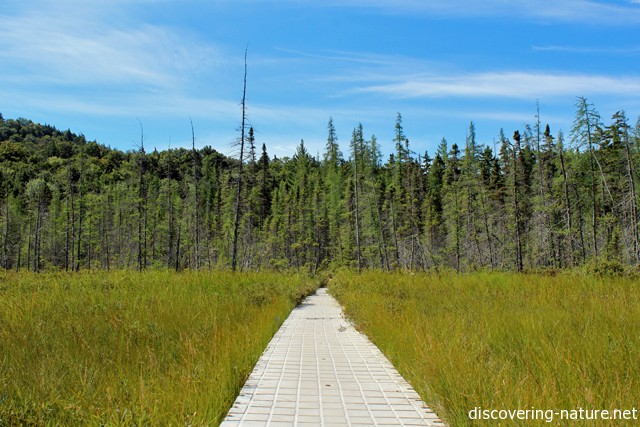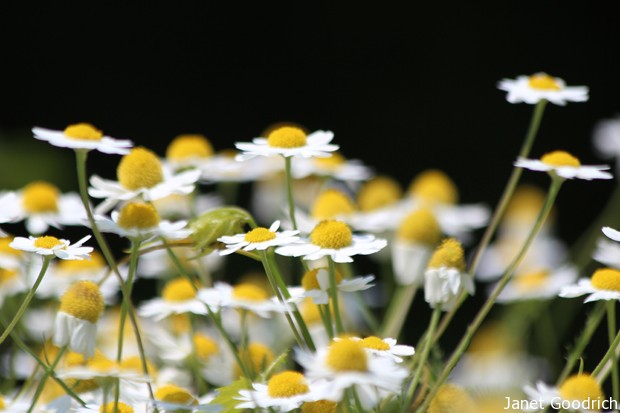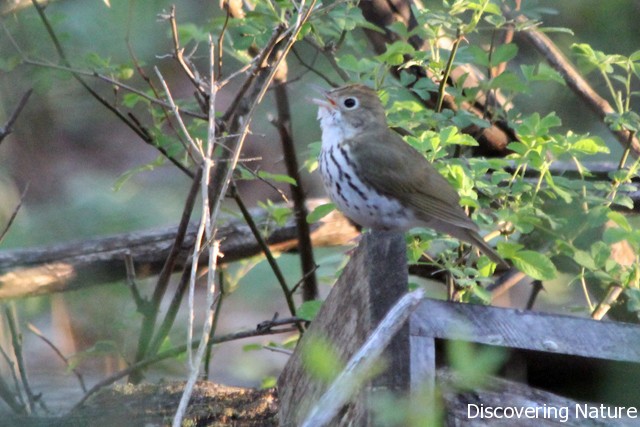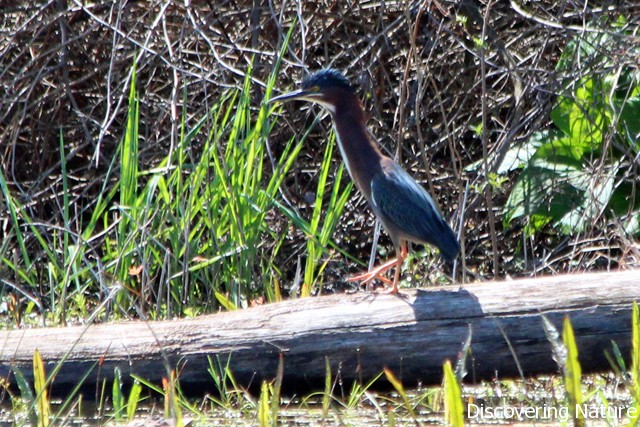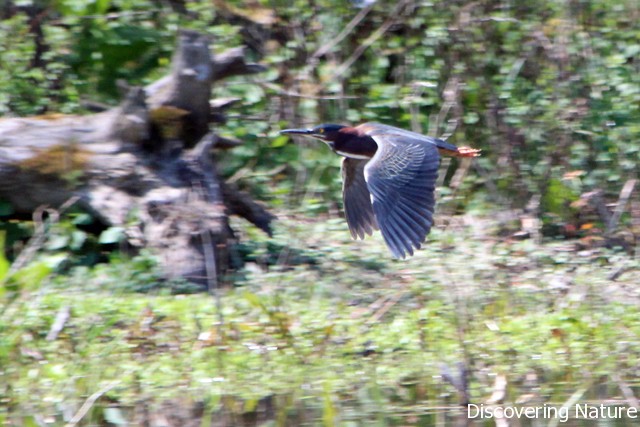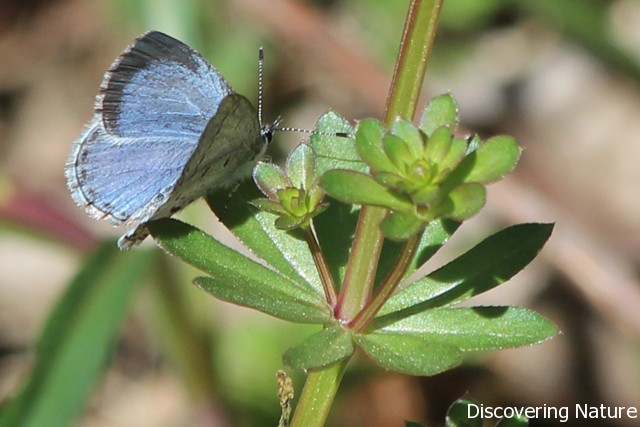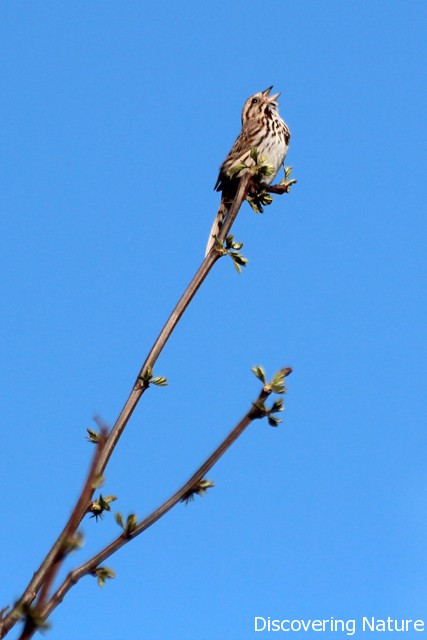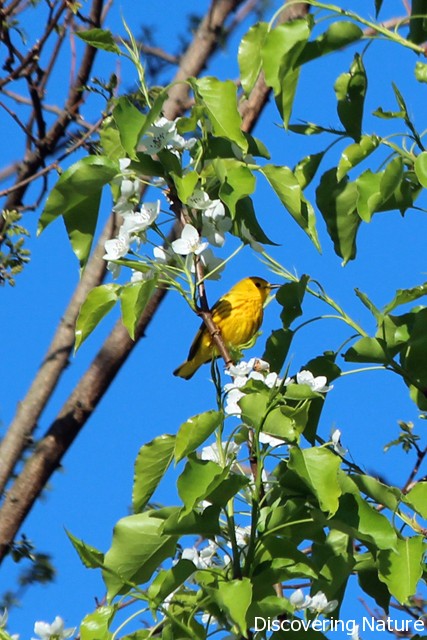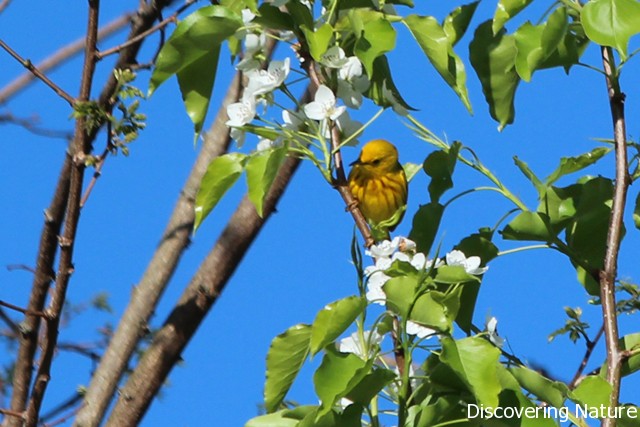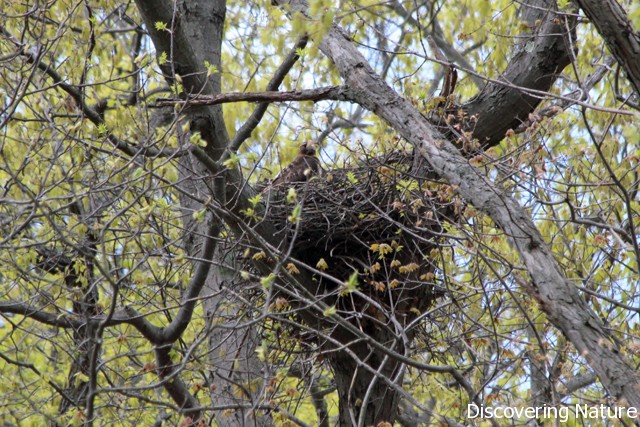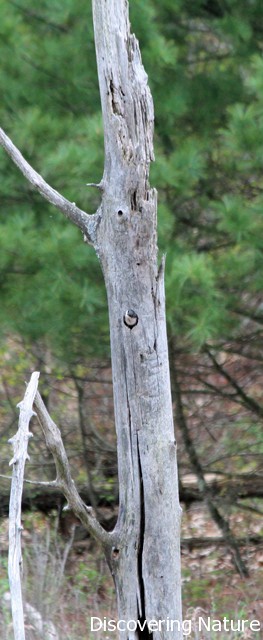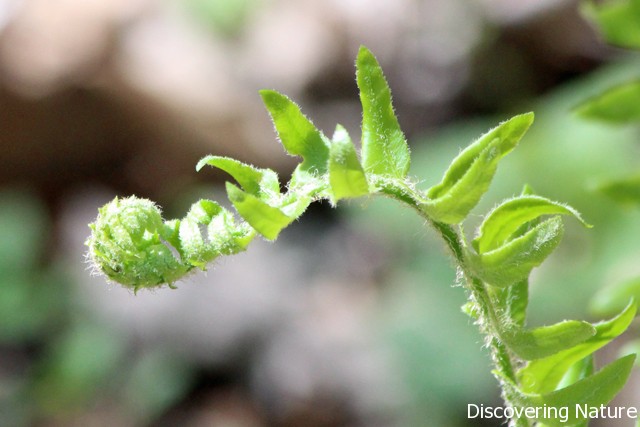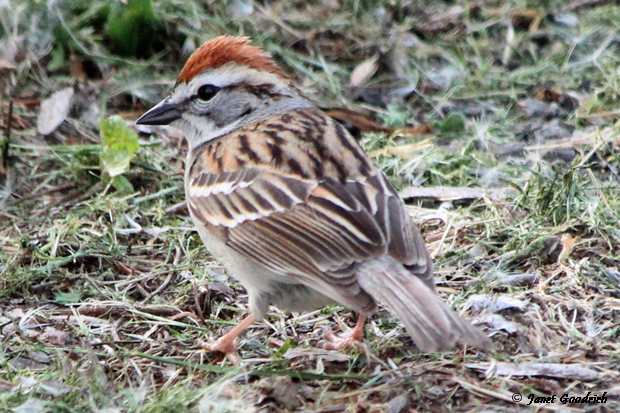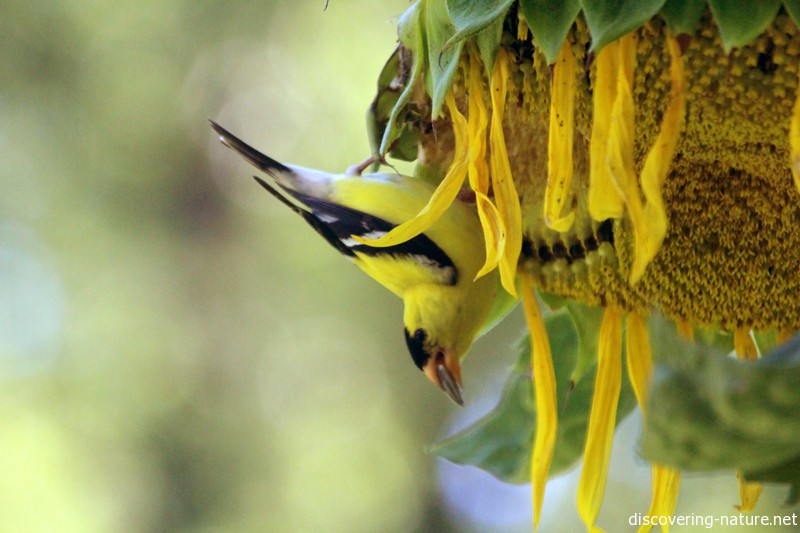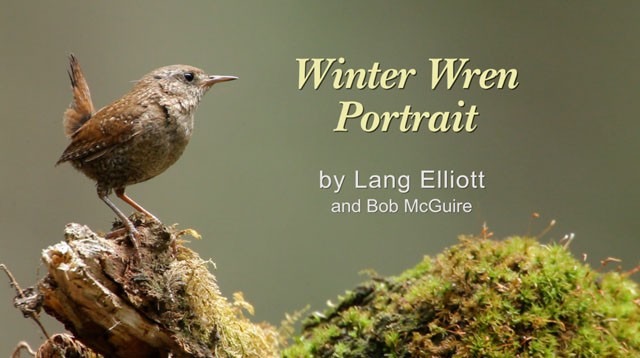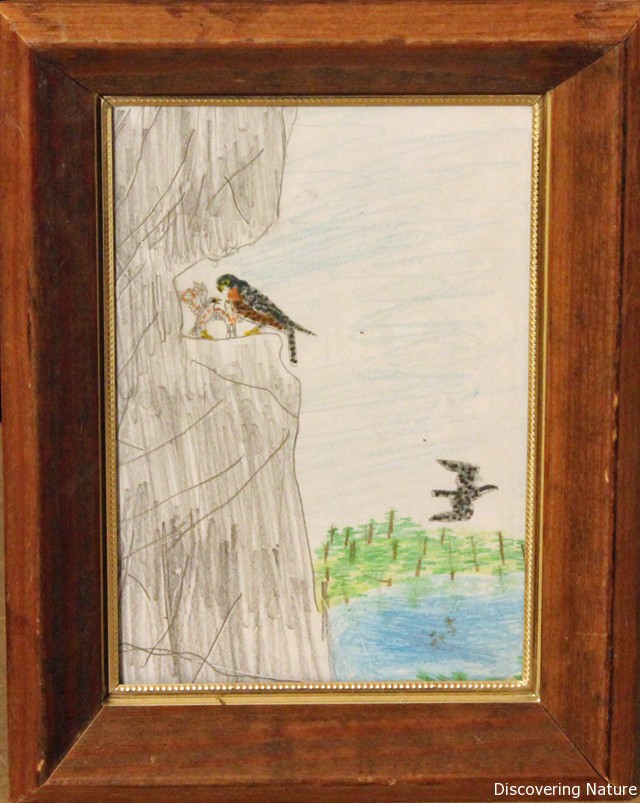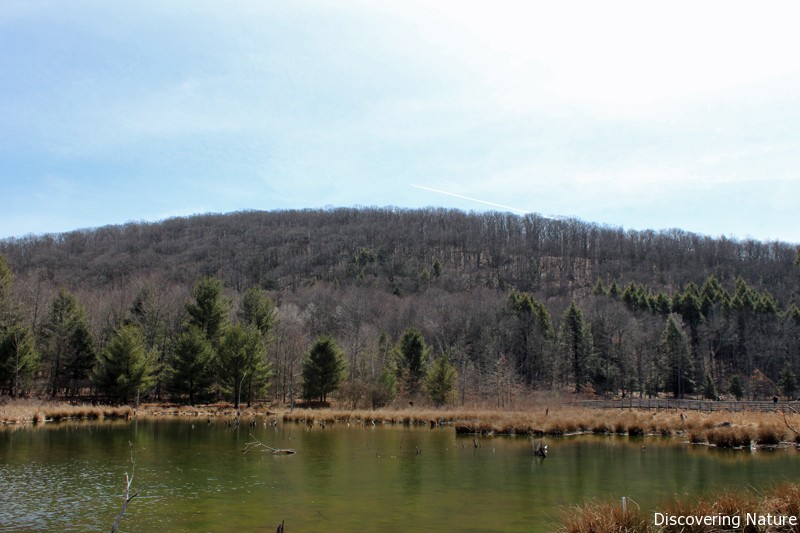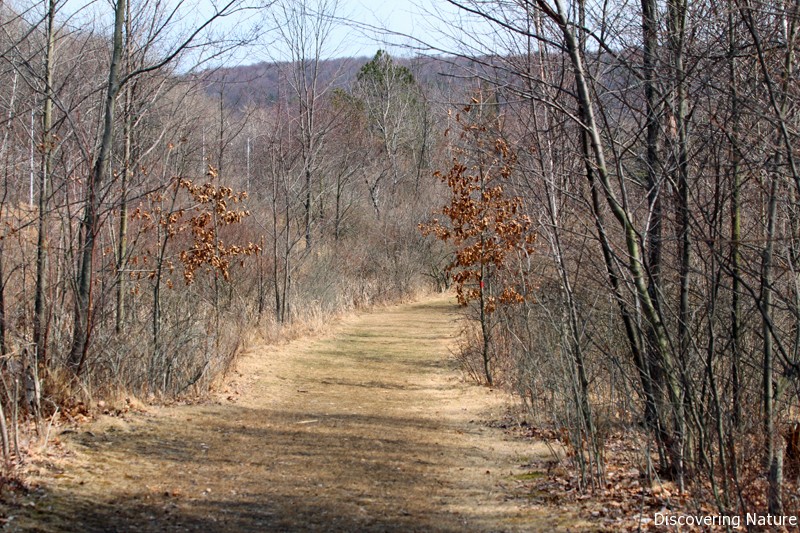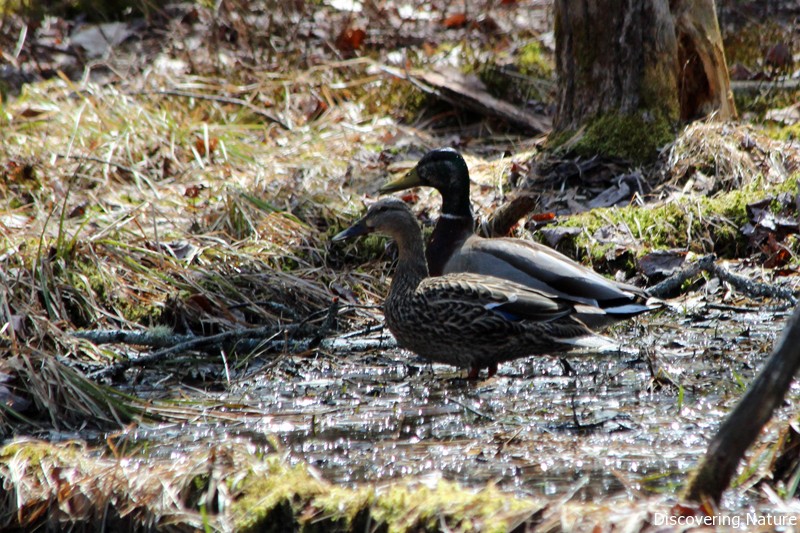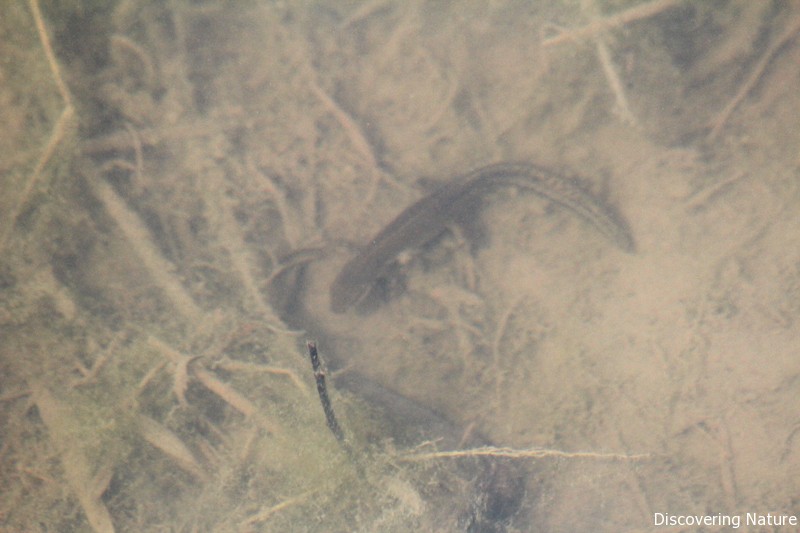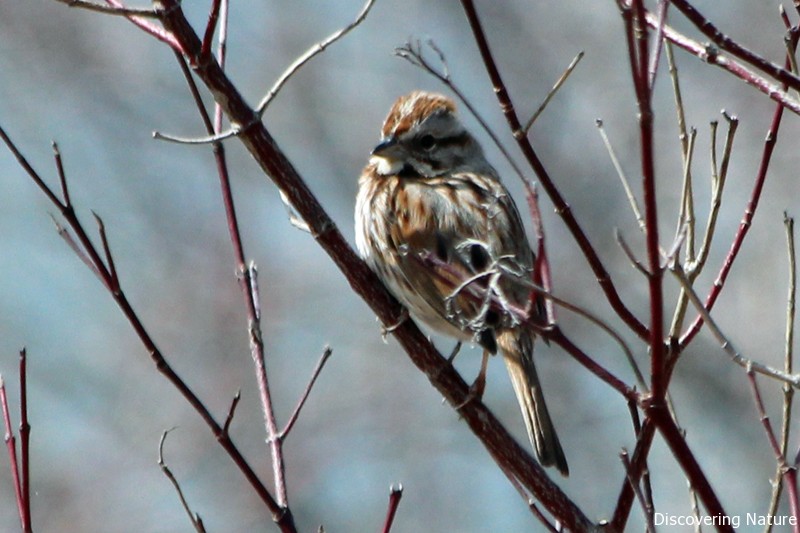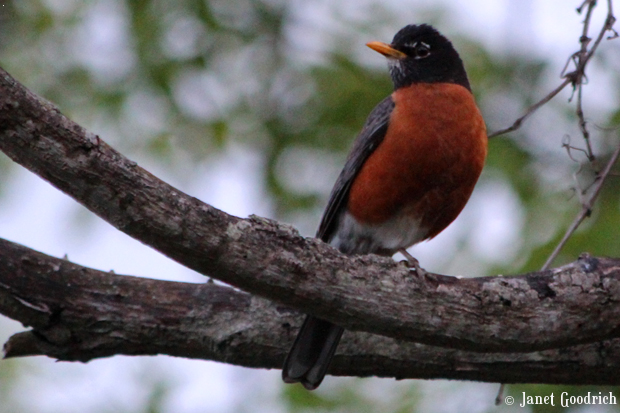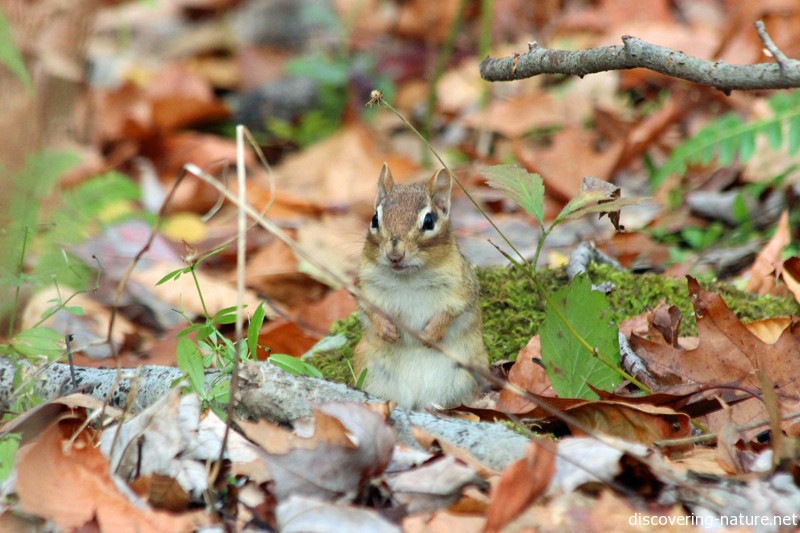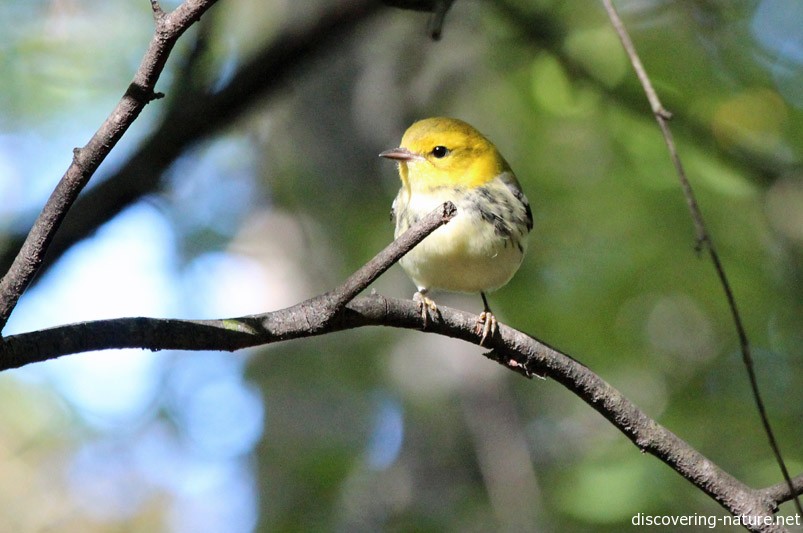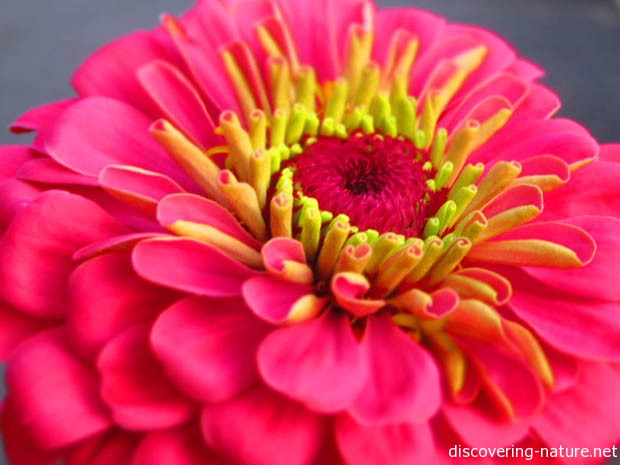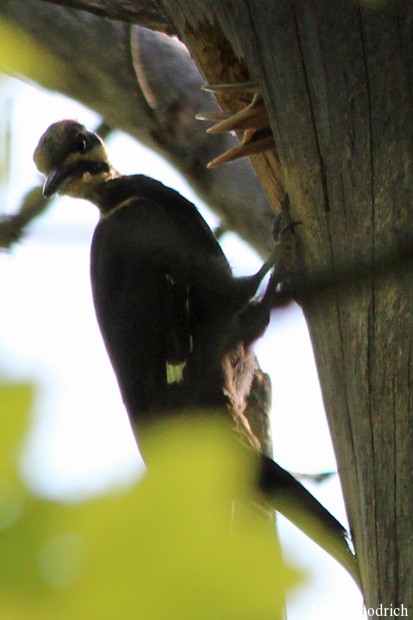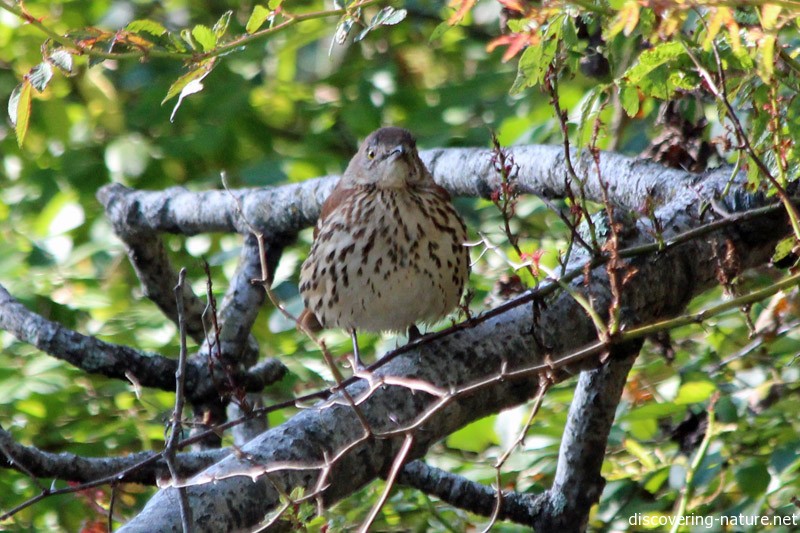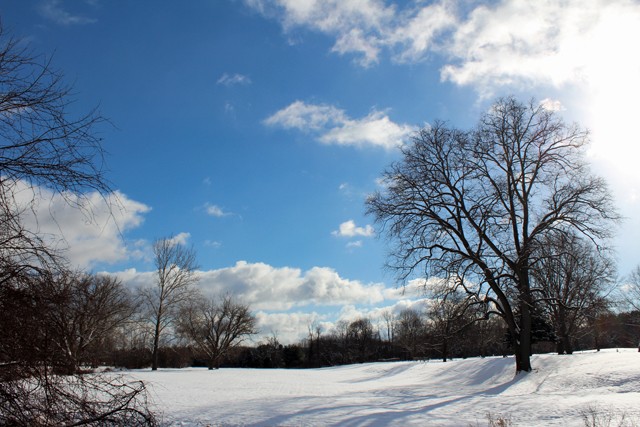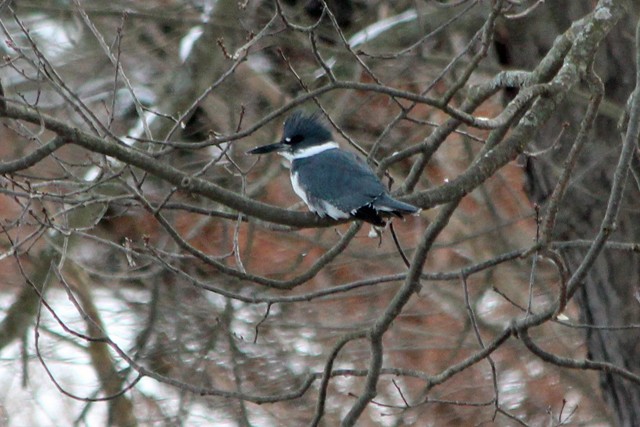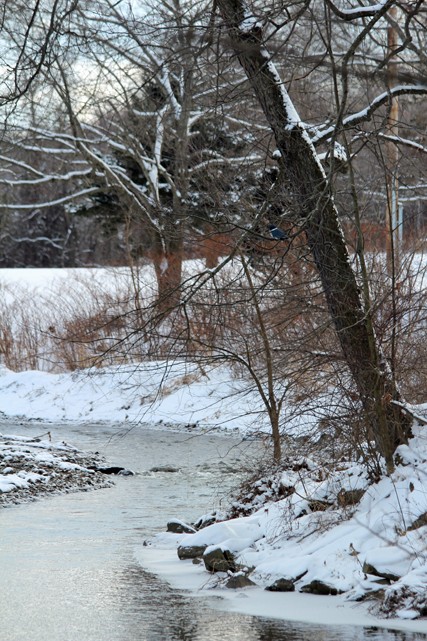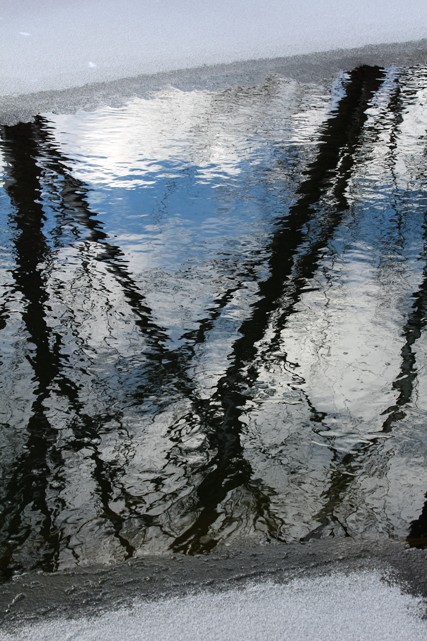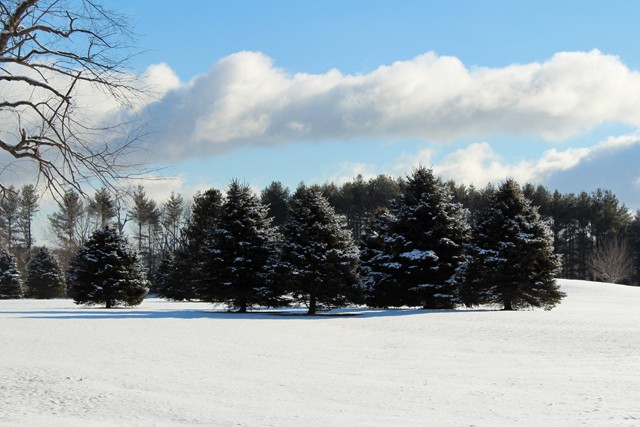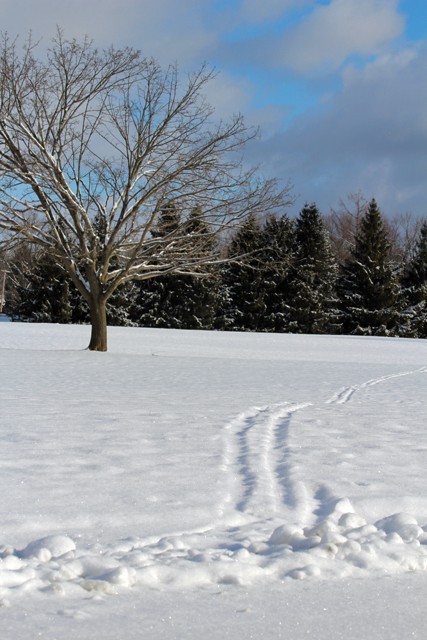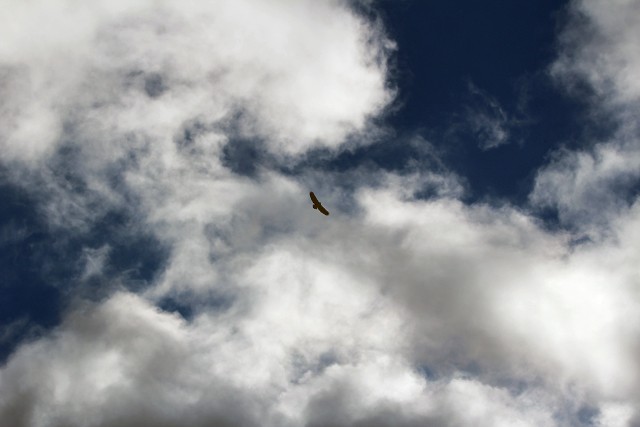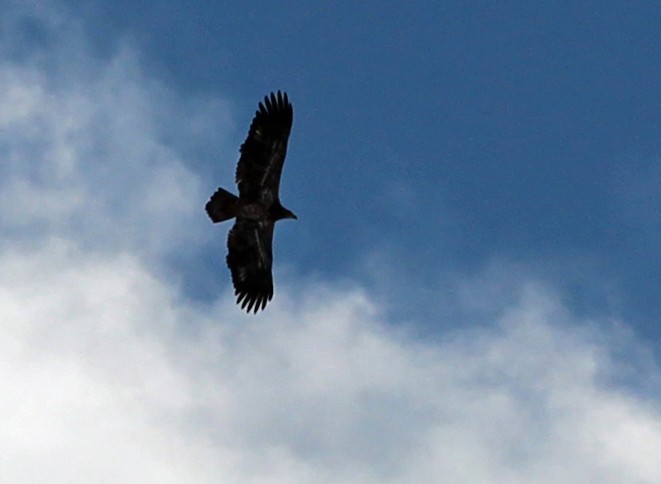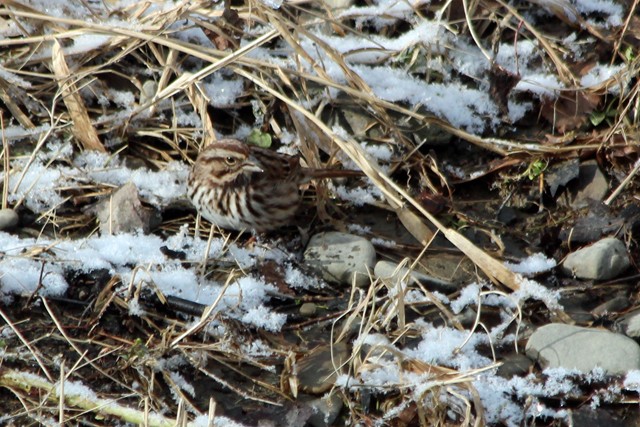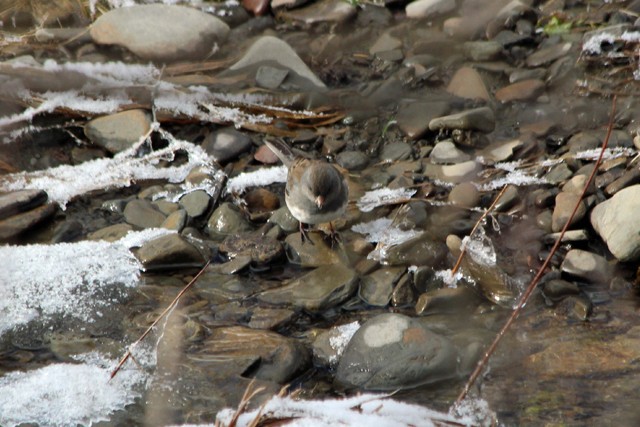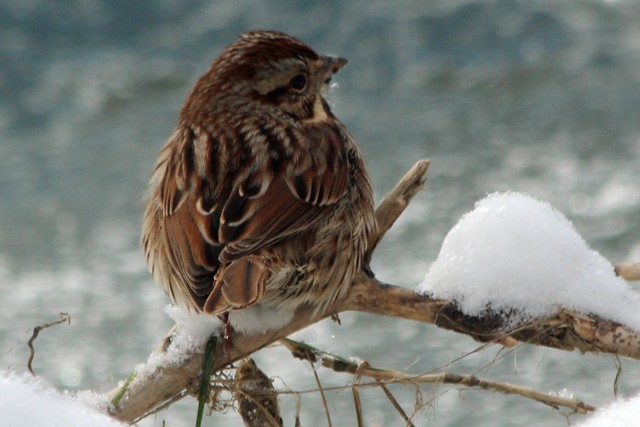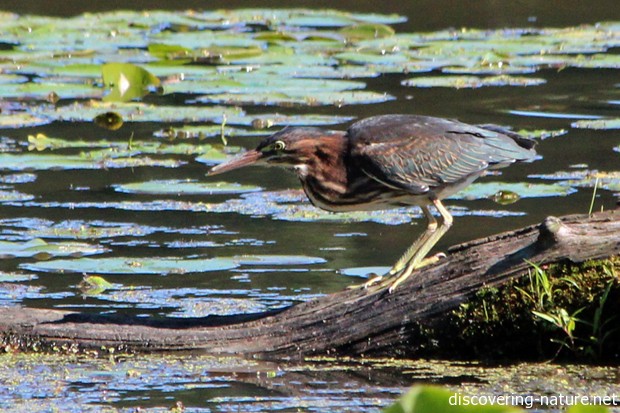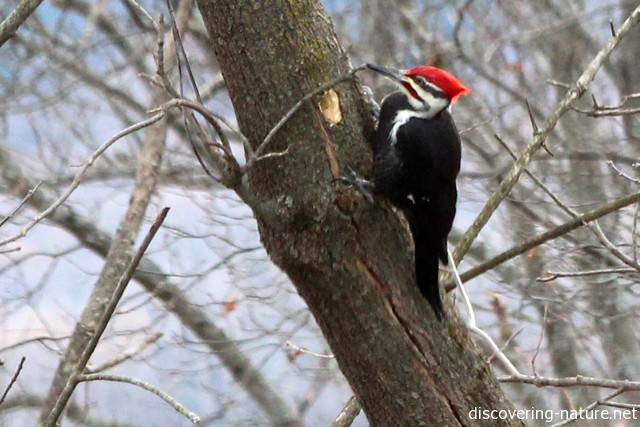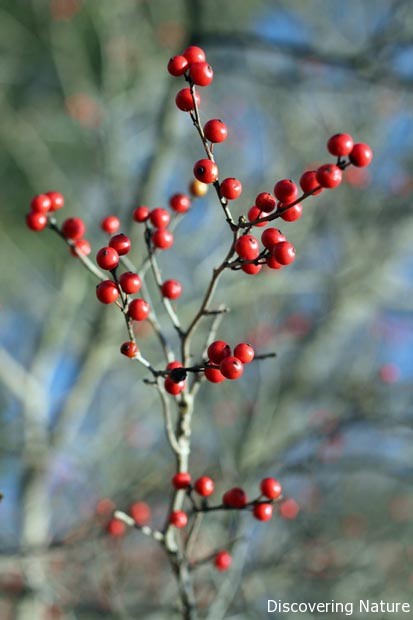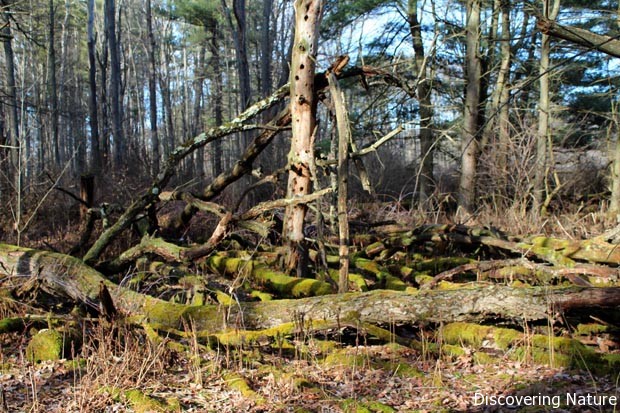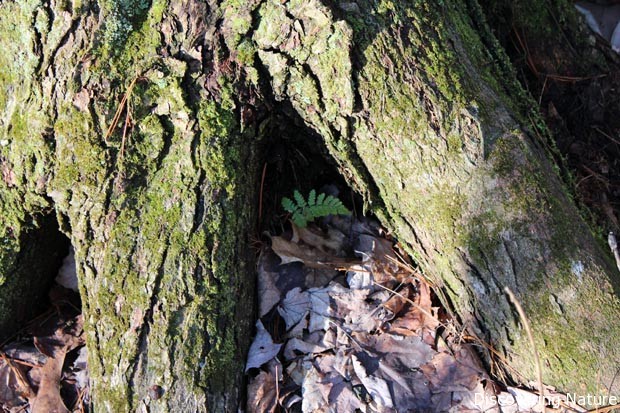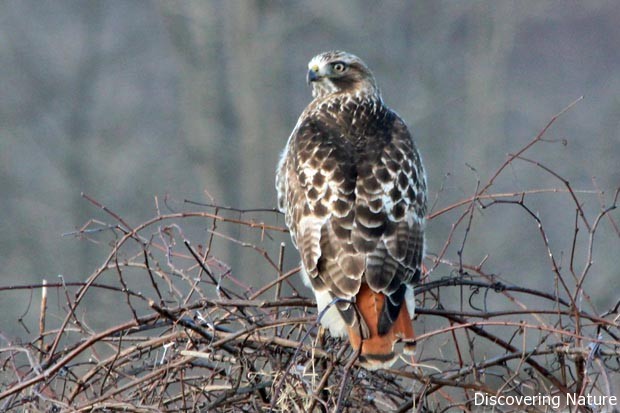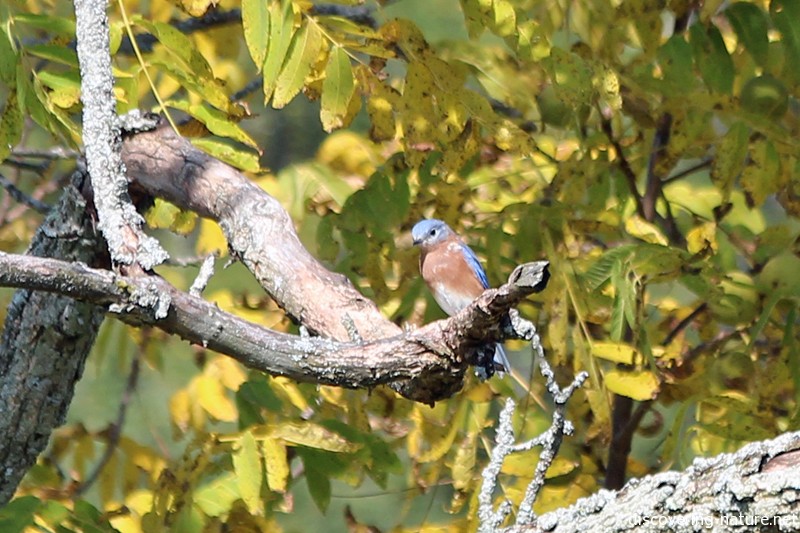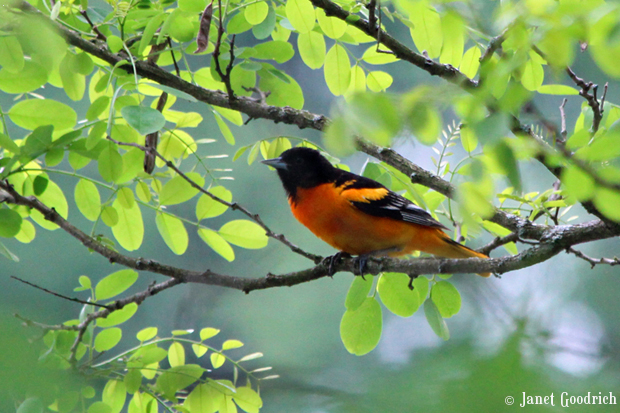Walks
-
Tanglewood
Sometimes, even the tail end of wildlife can be pretty cute…
…but then, goslings are cute from all angles.
Other things, close-to-the-ground, may require a certain perspective to be seen as “cute.” At the least, they’re indisputably well adapted.
We saw any number of butterflies, including this tiny specimen — which I believe to be an American Copper.
We were not only the observers at the Nature Center we visited today, however. Sometimes, we were the observed.
I think this is a young tree swallow. It didn’t take off the way I’d expect an adult to. It just observed us keenly.
This young oriole was one of a pair of males. They appeared to be getting along equably, then suddenly the mature one chased the immature one off across the field.
I enjoyed the red-winged blackbirds around the pond.
They seem common enough, yet I find them very pleasing to the eye.
One of the first things we saw was a bluebird — our state bird. On our walk we saw any number of chipmunks in the woods, and witnessed a drama between a blue jay and several great crested flycatchers darting and screaming at him until they finally chased him away. We also saw some downy woodpeckers, and lots of evidence of woodpecker carving in the trees. The prize was a sighting of a red-eyed vireo — a bird often heard but rarely seen. It sang right over our heads for a while, pausing only to smash a caterpillar to pulp at one point.
We heard several birds we never saw: oven birds, chestnut-sided warblers, a prairie warbler, a house wren, a common yellowthroat, a cardinal. A few months ago, a robin sighting would have been a highly prized assurance of spring; today we saw many robins without a second thought. A yellow warbler posed nicely for pictures (which I’ve posted in the preceding post).
Fortunately we got by without seeing a timber rattler. They’re common, but snake sightings in general (especially poisonous ones) are so far an aspect of nature study that has failed to win me over.
Tanglewood, the preserve we visited today, was a bit of a drive for us. It’s a nicely situated place with lots of walking trails and a mixture of meadow, pond and woodland. The grounds are well-kept both outside, and inside the nature center. They have a few captive raptors (a broad-winged hawk, a red-tail, a barred owl and a great horned owl), a possum, and a few other small rodents, birds, and reptiles. They also have an active honeybee colony — very neat to see. The exhibits are much nicer than our local nature center, which is choked with dusty taxidermy specimens, only a few of which are native species. It’s a hodge-podge, really, like someone’s attic full of collected natural artifacts. But at Tanglewood the exhibits are thoughtfully organized and effective as an educational experience.
-
Whitetail
I startled several of these on a walk last week. There may be a fawn hidden somewhere in the long grass… I saw one last year.
-
Something there is that doesn’t love a wall
My husband took us for a walk in the woods he played in as a child. There were several of these old stone walls converging in the middle of “nowhere.”
Once, it was “somewhere.” Someone’s fields. Several someones’ fields… Three walls met at this ancient oak, which still had rusted barbed wire emerging from its bark at several points. “Good fences make good neighbors.” Or so one man in Robert Frost’s poem says.
For perspective, here it is with the dog…
How old must it be? It’s lived through many years there — long enough to see at least this group of neighbors building and mending their walls. But now the forest is reclaiming this ground.
Something there is that doesn’t love a wall,
That sends the frozen-ground-swell under it,
And spills the upper boulders in the sun;
And makes gaps even two can pass abreast…And yet, something there is that does love a wall, too — loves being reminded of a larger order that we’re all a part of, and loves, always, to be reminded of good poetry and meditation.
-
Celebrating Seeing
My daughters and I watched this pileated woodpecker in our back yard as we were eating lunch the other day. She captivated us for several minutes.
No sooner had she flown away than a rabbit appeared, gathering up mouthfuls of grass and leaf litter and hopping behind some trees to pad her nest. Now we know where to look for baby rabbits.
On the whole, this raised awareness of the creatures living all around us is the biggest plus of nature study. Who needs television if you have a window? Who needs computer games if you have eyes? The interest is simply there; all that’s needed is a very little effort to cultivate awareness.
It’s not always easy to be aware, though. Sometimes it brings sorrow. This year I notice several different areas around where bulldozers have cleared space for some kind of development, and every one of them will have an impact on birds or other creatures that lived in those spaces. Where will they go? And how much more space do humans need to take over, mow down, dig up?
Even something like Habitat for Humanity (which recently produced a house on an empty lot nearby) gives me pause these days. It sounds so positive. And it is positive to give someone an opportunity to help build their own home. But why take up new space to do it? Why not redesign an existing building standing empty? Every city has more than enough houses already, more than enough retail buildings and factory spaces. Why not use and re-use these spaces, rather than relentlessly sprawling outward like some seeping toxic spill?
Oh well… enough of the lament. Suffice it to say that I wish we gave more thought such matters before mowing down the bushes and trees to construct new buildings. Awareness — the ability simply to pay attention to what’s around you, wherever you are — is where an environmental ethic begins. Not legislation or speech-making. Opened eyes.
Speaking of which, I have seen many interesting sights of late that I haven’t recorded here, and what follows will be a long column of wonders.
Starting with an oven bird! I’ve heard these leaf-like thrushes many times calling from the forest floor, but never have I been fortunate enough to actually see one till this past weekend, on an early morning walk.
He was having a territorial squabble with another one nearby. The woods were full of them! Here, he’s standing on the ruin of an old nesting box.
At a nearby pond, we’ve seen the first of the green herons…
We’ve seen geese nesting…
…and geese newly hatched.
As I stood watching, I noticed movement from one grass tussock to the next. Meadow mice were darting like lightning from hole to hole, right out in the marsh. They’re the color of dust, but otherwise they remind me a lot of hamsters.
Water snakes abounded. None of them looked big enough to eat a mouse, but the frogs and wogs must be on the run.
I think this tiny butterfly is a silvery blue. Its wings are only about a centimeter wide. The meadow was studded with them; I also saw one bright orange butterfly too elusive to photograph.
The chipmunks are coming out of hiding — well, they’re awake. Some are still hiding.

Find that chipmunk Others look like woodland mariners sailing deadwood ships.
Happily, my daughter and I saw our first rose-breasted grosbeaks the other morning!
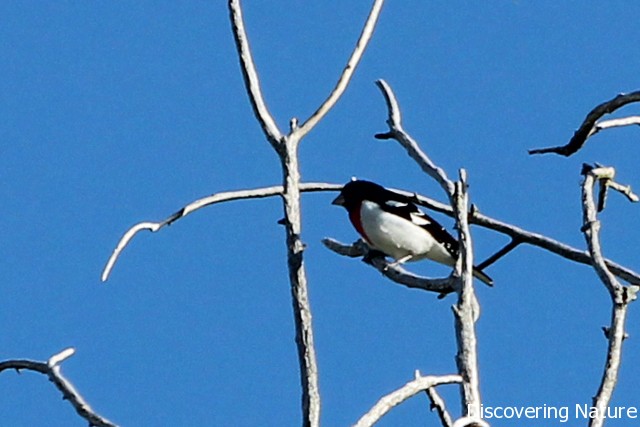
Mr Grosbeak 
Mrs Grosbeak There were other birds chorusing all around, including song sparrows…
…and yellow warblers.
It’s not every day that you get tracked by police while bird watching, but it happened the morning we saw these warblers. My daughter turned around, gasped, and said, “A police car!” We saw an officer circling our parked car and hurried back, fearing we’d broken some parking rule. “Oh, I was going to have her track you,” he greeted us, emerging from behind the car with a large police dog. Turns out he just saw our car and decided to take the opportunity to do some training!
There are several nests we’ve been keeping an eye on. We were thrilled to discover a red-tailed hawk nest in a spot we pass often, but it’s not terribly photographable. Still, as the nestlings grow and begin flappercizing, maybe we’ll get some better views (and pictures).
The other day, we were looking at a red-winged blackbird atop this snag when we noticed a tree swallow in a nest cavity beneath him.
Last but not least, the chickadees must have a few nestlings in this nest box outside our front window, because the parent birds have been active, flying to and fro and apparently feeding young.
It’s a great time of year for being outside. Here in the northeast the sense of release from the grip of winter seems so strong and so welcome.
Even our domestic animals like to get out and smell the flowers!

Whisper -
Happy
This makes me happy: two chickadees setting up housekeeping in our chickadee house. We put it up last year and nobody used it. This year it apparently makes the grade for these two! We’re going to call them Chuck and Dee Dee.
Saw our first yellow-rumped warblers today:

Mister 
Mrs As well as this elusive chipping sparrow.
Also saw some fiddleheads!
We found a second hawk nest to monitor on our way to the marsh. I caught a flutter of wings and a flash of red in some trees beside the road, looked more closely, and saw it was a red-tailed hawk lighting on a branch beside a stick nest. It’s the second twiggy mass we’ll be keeping an eye on!

Red-tail pair -
Spring Preserve
-
Morning Discoveries
Older Daughter and I took a walk on Saturday morning. It turned into a sunny day in the 50’s, but the day began frostily, especially in the shadier patches of trail.
We stopped to visit the resident raptors at the nature center before starting out, and we found a surprise: a squirrel who’d gotten trapped (temporarily, we hope) in one of the empty rooms.
He disappeared through an interior passageway somehow, and provided he didn’t end up in the hawk cages he probably came out all right. We saw no evidence of tragic demise when we returned on our way home.
It warmed eventually and we enjoyed some beautiful morning vistas.
There were lots of robins about…
…as well as some chickadees. I always think of Blackbeard the pirate when I look into these snappy little eyes.
There were some sobering sights as well. This pile of feathers is all that remains of some kind of ground bird or duck caught unawares.
And a little further on, this lay in the center of the trail.
Of course these are horrible sights and I hesitate to post them. (I did resist photographing the several piles of coyote scat we also saw along this upper meadow where the deer bed down at night.) But anyone who sets out to “discover nature” has to come face to face with them at some point. There is the beautiful, scenic, astonishingly adapted side of nature — and there is the predatory side. When I come upon things like this I can’t help but think of the last moments of whatever animal has become a meal, and of the violence the remains testify to. There are other factors too — the hunger of the predator, satisfied only by cunning and strength and persistence, and these are all part of the picture as well. But I still haven’t found a way to process sights like this easily.
-
First Birdsong
We seized upon the first sunshine in what seems like ages to go for a walk this morning. As far as sights go, it was mostly about textures and colors in little patches here and there.

These lichens seem to be doing their best to hurry spring along, stretching out toward the sun. 
It’s amazing, the variety of textures growing on this one furry tree foot. Here’s a close-up of the same tree:
There were other small wonders, like this tattooed rock…
or this woodpecker hole (I heard the pileated laughing in the distance)…
or this fallen tree. When I stop and study all the varieties growing here I wonder what it would be like to be small enough to live among them. It’s kind of strange thought, but there it is. There just seems to be such diverse vegetation in such a small area. (The pic will enlarge if you click on it.)
The vernal pool was still iced over and had a layer of snow over it, but in the deeper pond we did actually see a salamander or two. I didn’t envy them.
No beavers, though the lodge is safe and sound. No muskrats. A few deer. Two accipiters; one redtail sailed over. We heard cardinals doing warm-ups, and chickadees singing their spring love songs. And at the pond we heard what I think was a song sparrow singing like he meant business. I didn’t see him, but his song cheered me. It may not sound like much, but the first song of spring means a lot to a color-deprived Northeasterner like myself.
We headed for home after that, assured that all is progressing toward the warmth and color and wakefulness of spring. Just a short wait now.

I played with some of the artistic filters on this pic. -
Glitter and sparkle
Just before we got to Hickories Park, I wondered if kingfishers migrate. I got my answer immediately: they don’t. Or at least, they haven’t yet. This was perched over the fastest current on a bitingly cold morning.
He was quite talkative, but even with all the rattling, it was hard to get my eye on him whenever he changed perches.
Even the water was shivering, and the ice made strange noises. Maybe there was a muskrat under it.
Cold blue and white and glittering snow everywhere.
A juvenile eagle sailed over us — always an inspiring sight.
And along the stream, little birds were hopping like popcorn. It was as if the ground was moving, they’re so similarly colored. Mostly sparrows and juncos.
There’s an old gospel song: “His eye is on the sparrow, and I know he cares for me.” I hope he’s keeping a closer eye on me than the sparrows. They looked awfully cold, and there are plenty of predators that would like to eat them. They were too busy to think about that though. There is something inspiring and cheering about the way they get down to business and do what they have to do to survive. I celebrate sparrows. We nondescript types have to stick together.
-
Frog on ice and other sights
To celebrate the sun’s return from long vacation, we took a walk at a nearby marsh today. Most of the snow has melted, and I’m convinced at least some of the birds are confused. They’re certainly vocal — I heard a titmouse belting out his piercing call on my neighborhood walk this morning, and yesterday there was a goldfinch in the tip-top of a tree, singing his heart out.
Today I saw something a little more down to earth. We’ve probably all heard the illustration about the frog boiled alive in a science experiment as the heat was turned up so slowly the frog didn’t feel it happening. But this is the first time I ever saw a frog sunbathing on ice.
The only birds we saw in the woods were crows and one downy woodpecker. There was a red-tail in the distance, and he treated us to a few wild shrieks as he flew over. Most of the beauties were small things — bursts of color in the predominantly gray-brown drabness of the woods.
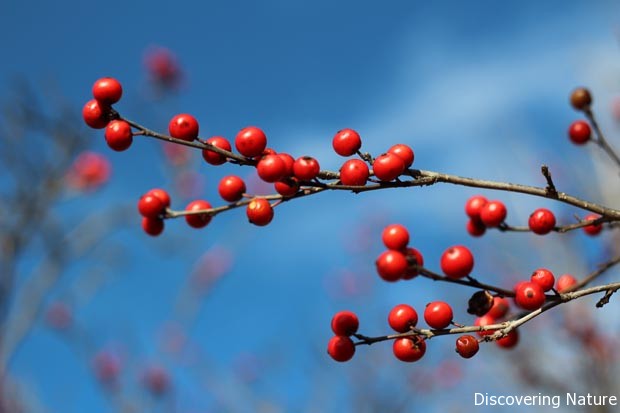
Winterberries I read somewhere that these berries are a last resort food for deer. If I remember correctly from last year, they won’t last much longer before shriveling and disappearing.
The woods near the marsh have a primeval feel — lots and lots of dead trees, many of them fallen and covered with moss. The varieties of moss really stand out this time of year — so rich looking and so many different textures and shades of green.
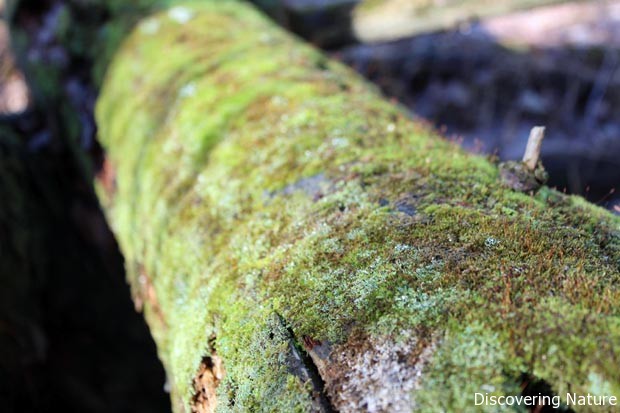
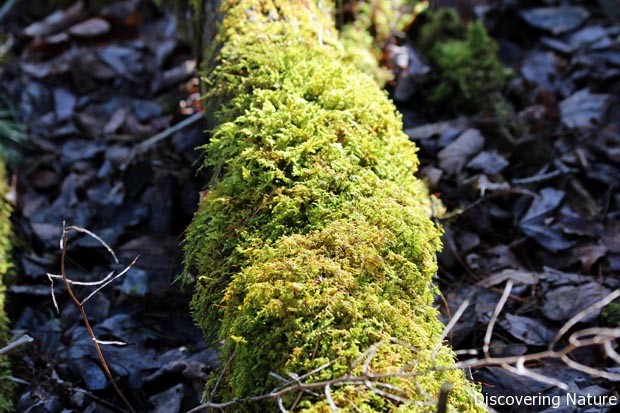
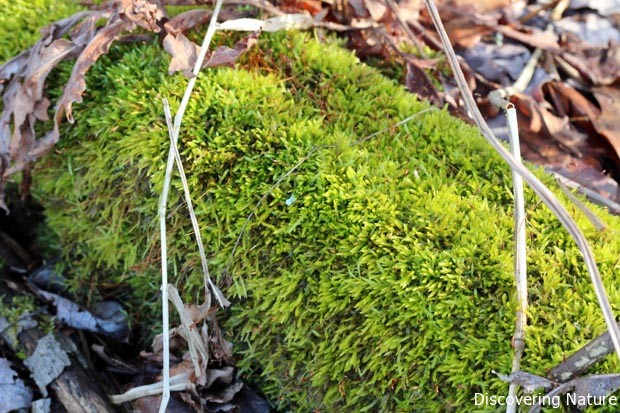
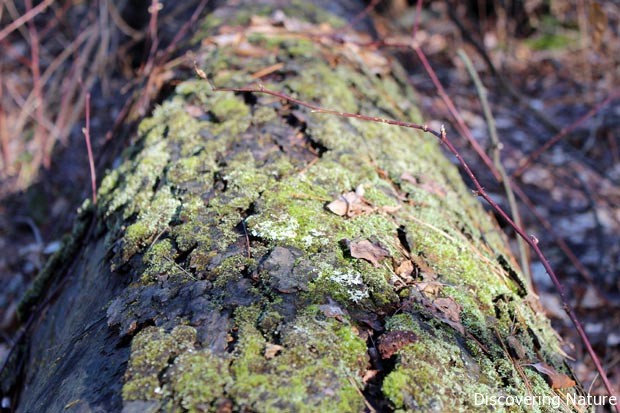
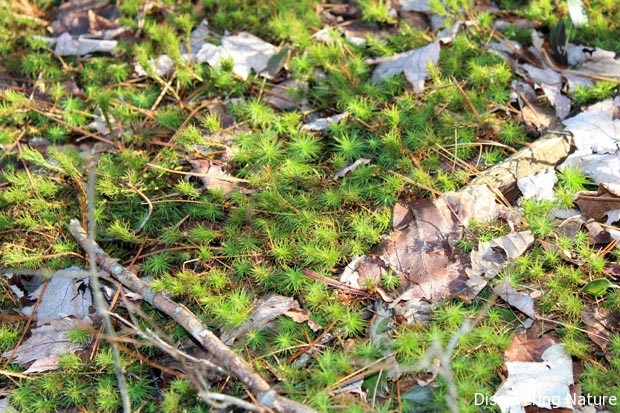 It sounds morbid to say it, but moss always strikes me as a beautiful window dressing for decay. These trees have surrendered — the girls love to climb in among them. They call it the carpet store.
It sounds morbid to say it, but moss always strikes me as a beautiful window dressing for decay. These trees have surrendered — the girls love to climb in among them. They call it the carpet store.And these are making their slow descent.
I stood beneath these for awhile, listening to what I thought at first might be a woodpecker, but what turned out to be simply the creaking and rubbing of this tangle of tree trunks. Then I called the girls over and asked them to listen. “A woodpecker!” Younger Daughter immediately exclaimed. It made me feel better.
This tree had ferns between its toes.
The marsh has a decrepit bird blind that we always walk out on — with some fear and trembling. It’s pretty old, and I think it’s been flooded numerous times. One of these days we may discover its limitations.
 The view is worth it — beautiful in a lonely kind of way.
The view is worth it — beautiful in a lonely kind of way. In warmer seasons we’ve seen green herons, great blue ones, blue-winged teal, wood ducks, mallards. There are muskrat lodges all over the place as well.
In warmer seasons we’ve seen green herons, great blue ones, blue-winged teal, wood ducks, mallards. There are muskrat lodges all over the place as well.That’s about all. It was wonderful to feast our eyes and ears, and to feel released into the wide world.
On the way home we saw several red-tails. I’m not above stopping along a busy road to admire these fierce, regal birds.
